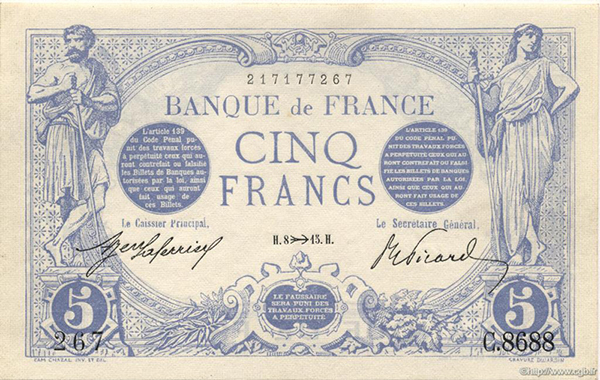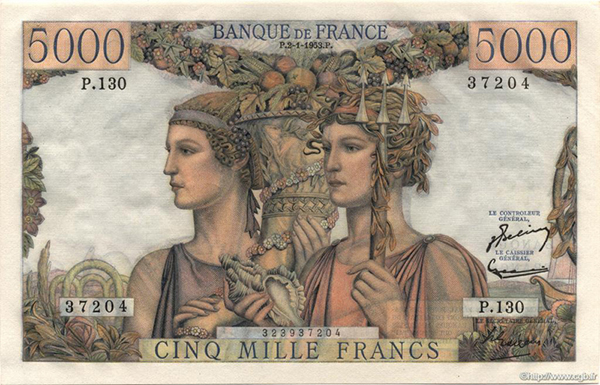
French Banknote Theft
Between August 7 and August 20, 2009, I was the victim of a theft, and would like everyone to be aware and on the lookout for some stolen banknotes.
The two French notes pictured below (SCWPM P.2/Fayette F.02.33 alph C.8688, #217177267, and SCWPM P.131c/Fayette 48.08 Alph P.130 #323937204) were purchased by me from the Compagnie Générale de Bourse (CGB, Paris France) in their Papier Monnaie 14 auction of June 25, 2009 as auction lots 47 and 247.
For a variety of reasons, they were not shipped until August 7th. Upon delivery to me on August 20, 2009, I found the package empty. I will be pursuing this through the postal services, of course.
Fortunately, CGB is refunding my payment, so monetarily I will not be out much on this incident. Of course I still hope (as does CGB and their insurance company) that the banknotes are eventually recovered.
These notes are quite rare, both are in UNC condition. If you come across these notes through a dealer, auction, eBay, or other source, I would certainly appreciate contact through this site.
Thank you,
Dave Mills


As this process goes on, I've learned a few things that might be helpful to other folks who want to protect themselves against this kind of theft. I've listed them here, better to know them before you have a similar incident.
The Signature: The US Postal Service uses form 3849 to collect the signature required when delivering packages. They have insisted before, during and after this incident that "your signature does not acknowledge that the contents are in the package, only that you received it." In other words, they insist that I do not need to open packages in front of a USPS employee before signing the form. The French (generically, and possibly specifically La Poste), are much more likely to posture that once signed for a transaction is complete, and one should never sign for a package before opening it. I do not yet know what policy applies on an international delivery such as this one, but I no longer plan to sign for any expensive delivery without opening it first.
The Package: I have stared at this particular package far longer than any other package I've received. In retrospect, I can now see that there were signs that I might have recognized as tampering, without opening it. So in addition to the position of opening such packages before signing for them, it is of course a smart thing to examine the outside carefully to see if anything looks suspicious.
Time: While there was a feeling that "time is of the essence" since the moment I opened the package, the various parties involved do not seem to share the urgency to get on with things. Frankly it has been up to me to keep pushing on this issue, and it appears that to everyone else, this is "just business". It's a balancing act, trying to impress a sense of urgency about the issue while not being so aggressive as to alienate someone who may actually be trying to help. All I can say is, especially with the French, expect delays, and don't expect someone else to take the issue off your shoulders.
USPS Support: So far, USPS support on this incident has been a blend of delay and misdirection. It's really unfortunate to have to say it, as I've always felt sort of a camaraderie with the post office - after all, they've brought me much happiness in the mail through the years.
Since August 21, I have been requesting a letter from my postal carrier stating the condition of the package as she delivered it, as well as documentation of the signature policy. While my carrier has been a friendly face during this process, her management (up through the Postmaster) has refused to allow such a letter (which has been requested by the insurance carrier in France), and has not even responded to my letters requesting this information. Dead silence. I finally heard back from the USPS Office of Consumer Affairs on Sept 11, who tells me that the French insurance carrier is always welcome to send a letter requesting such information, and that it simply is never given out to the actual customer. We'll see if that goes anywhere, and it took three weeks after the incident to get this piece of information.
So far, the only lesson here seems to be "don't expect the USPS to help you".
Payment: While I am grateful to CGB for providing a refund on these notes, I realize that my payment (wire transfer) mechanism was not the safest for me in the case of a less scrupulous dealer. A payment via credit card or Paypal, might have been reversed on a complaint of non-delivery, putting the problem square on the seller. In my opinion, the seller in this situation does have the financial responsibility to address the issue, assuming he was the one choosing the shipping and the insurance carriers, but you would certainly create an immediate adversarial relationship if you reversed charges.